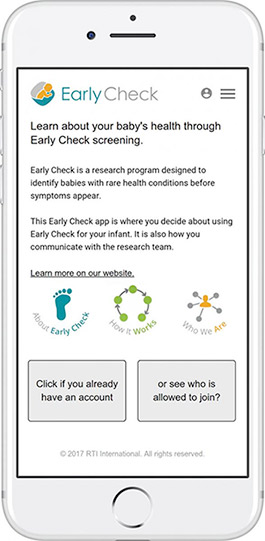CTSA Program Investigators Collaborate to Enhance Newborn Screening
Don Bailey, Ph.D., director of the Center for Newborn Screening, Ethics, and Disability Studies at RTI International in Research Triangle Park, North Carolina, had been on a quest to collect evidence to support the inclusion of fragile X syndrome and other rare genetic diseases in standard newborn screenings. These efforts had stalled because adding a new screening test to the set of these screenings requires that an effective treatment be available for the specific disease.
It's a catch-22 situation and a translational bottleneck: Without evidence that a treatment is more effective when started earlier, a test for a genetic disease cannot be included in the standard newborn screening panel. But the evidence cannot be collected without a screening program. Rare disorders, like fragile X syndrome, pose an even greater challenge because of the tremendous difficulty identifying enough cases to conduct studies, especially before symptoms appear.
Efforts are now underway to change that through Early Check, a research program in which up to 120,000 North Carolina families each year will be offered voluntary screening for fragile X syndrome and other genetic conditions yet to be determined. NCATS is supporting Early Check through a Clinical and Translational Science Awards (CTSA) Program Collaborative Innovation Award (CCIA).
The NCATS support is enabling an interdisciplinary team from RTI and three CTSA Program hubs to collaborate on developing and implementing Early Check while tackling other translational hurdles inherent in conducting large-scale, multisite research. The team, which is led by Bailey — the principal investigator for Early Check — is developing innovative electronic formats for educational materials and the informed consent process. In addition, the study sites have agreed to rely on a single institutional review board (IRB) to streamline ethics reviews of the study.
"NCATS' CCIA served as a catalyst to bring together our synergistic areas of expertise to tackle the very difficult challenge of diagnosing and treating rare diseases," said Bailey. "Our goal is to establish and prove the benefit of a foundation that could be used to evaluate screening tests for many other conditions."
 Fragile X syndrome is caused by changes in part of the X chromosome. It is the most common cause of inherited intellectual disability in males and a significant cause of intellectual disability in females as well. Although there is no cure for fragile X syndrome, early intervention can help children achieve their full potential. However, these therapies cannot begin until a child is diagnosed, usually about age 3. The Early Check project, supported in part by The John Merck Fund, is designed to determine whether high-quality early intervention strategies, initiated well before they are usually provided, can have a significant influence on children's development and family outcomes.
Fragile X syndrome is caused by changes in part of the X chromosome. It is the most common cause of inherited intellectual disability in males and a significant cause of intellectual disability in females as well. Although there is no cure for fragile X syndrome, early intervention can help children achieve their full potential. However, these therapies cannot begin until a child is diagnosed, usually about age 3. The Early Check project, supported in part by The John Merck Fund, is designed to determine whether high-quality early intervention strategies, initiated well before they are usually provided, can have a significant influence on children's development and family outcomes.
"Often, parents first become concerned when their child is about 1 year old and appears to have language delays or difficulty learning to crawl or walk," said Cynthia Powell, M.D., M.S., lead investigator for the team from the University of North Carolina (UNC) at Chapel Hill. "The families may consult pediatricians and a variety of specialists before genetic testing finally reveals the cause of the child's developmental delays. By then, the window for early intervention is closed, and the parents might even have an additional child born with fragile X syndrome." Through Early Check, receiving a diagnosis when a child is only a few months old could help families by reducing the typical three-year diagnostic delay, opening up possibilities for early treatment.
As one of the CTSA Program hubs involved in the Early Check project, the North Carolina Translational and Clinical Sciences Institute at UNC will coordinate confirmatory testing following a positive screening test, clinical follow-up support for identified patients, and genetic testing for family members. The UNC bioinformatics group will support RTI experts to ensure the security and privacy of study data and participants' health information. RTI will establish a research registry and initiate natural history studies for identified children. Key to the project's success is a strong partnership with the newborn screening program at the North Carolina State Laboratory of Public Health.
Two additional CTSA Program hubs have integral roles: The Wake Forest Clinical and Translational Science Institute in Winston-Salem will provide research bioethics expertise for Early Check, and the Duke Clinical and Translational Science Institute in Durham will provide guidance on linking families with clinical trials, depending on the particular condition being screened.
How Screening Works
The initial Early Check screening panel will test for fragile X syndrome and one or more additional conditions.
"Our goal was to select conditions that were not approved for the newborn screening panel as established by the federal government," Powell said. "We looked for rare genetic disorders that occur frequently enough in the general population that we would be able to enroll several patients with true positive results."
Early Check information will be available in obstetricians' offices, birthing centers and hospitals. Educational and informed consent materials will be accessible mainly through electronic media. The researchers will arrange for Early Check testing on the blood samples already being collected from infants' heels and allowed to dry on absorbent paper cards as part of the state's standard newborn screening. The research team will inform the parents about the test results. Confirmatory testing will be done for any positive screening results.
Powell anticipates the screening tests will be negative for most infants in Early Check, which may give some parents greater peace of mind. "Learning of a positive result, however, enables parents to explore options and increase their understanding about the different possibilities for their child," she said.
New Models for Education and Consent

Families from anywhere in North Carolina will be invited to participate in Early Check. But a key translational hurdle for research conducted at multiple sites is ensuring that informed consent is administered in a consistent and effective way. In addition, informing and obtaining agreement to participate from up to 120,000 families per year would be nearly impossible if the families and researchers had to meet in person to go through the consent process. To address these challenges, the Early Check team is implementing communication strategies that include the use of electronically accessible materials.
"The consent process will be critical to the success of Early Check," said Nancy M.P. King, J.D., an expert in bioethics and informed consent at the Wake Forest School of Medicine. "Early Check is intended to be a prototype for investigating the feasibility of adding new genetic screening to newborn screening panels nationwide. We are making the education, outreach, and consent and permission processes available in electronic form, allowing many new parents to enroll using a smart phone."
Still, the ethical concerns are potentially complex, and testing can be confusing. Some new parents may not fully understand standard newborn screening, King noted, requiring researchers to spell out differences between the Early Check research program and standard testing. "There are concerns that adding Early Check into the hospital experience might cause people to refuse the standard newborn screening, but past experience shows that is unlikely," she said. King thinks the Early Check model will help determine whether it is possible to surmount several translational challenges, such as facilitating newborn screening for new candidate conditions and simplifying efforts to recruit children into clinical trials early, before symptoms appear. If successful, the program could serve as a model for other states considering how to develop the evidence needed to add new conditions to their newborn screening programs.
"Early Check's streamlined design — relying on a single IRB and using electronic media for informed consent and participant education — could be a model for other large-scale studies of inherited disorders," King said. "We want to establish a foundation for testing other candidate conditions so that avoidable delays in diagnosis can be eliminated and early treatment can be initiated if it is proven effective."
Originally published at ncats.nih.gov.